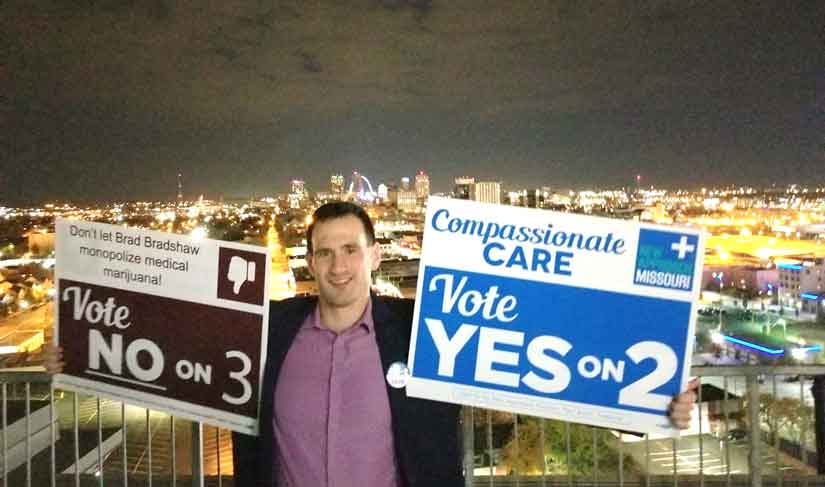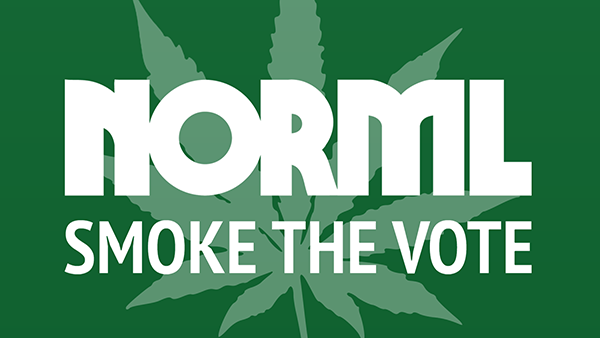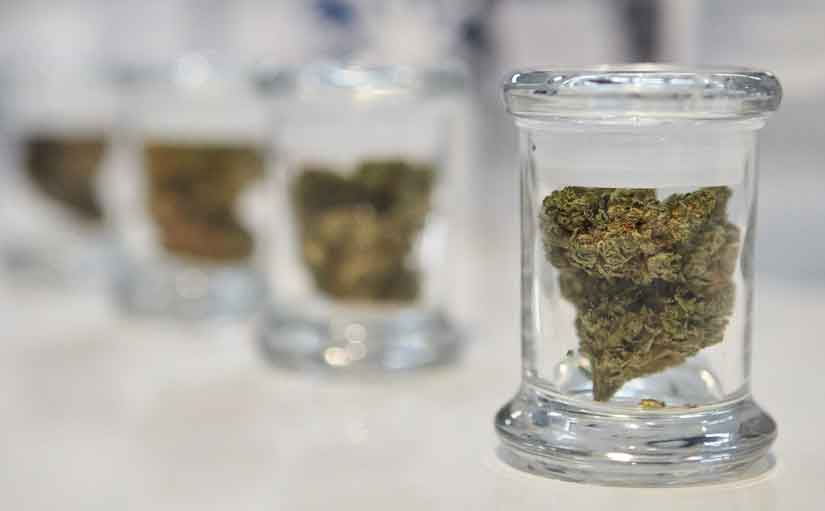Amendment 2 Passes by 66%

(St. Louis, MO 11/7/2018) – Amendment 2 (A2) supporters claim victory in St. Louis at a heavily attended watch party atop the Angad Arts Hotel in the mid-town arts district on November 6th. Campaign manager John Payne for New Approach Missouri exclaimed, “the reason we won and Bradshaw didn’t is he is one guy with a lot of money,” and we just proved that, “he can’t buy an amendment and just write himself into the constitution.” The New York Times called A2 the winner early in the election night party.
Amendment 2, a constitutional amendment to allow medical cannabis, easily passed in Missouri by grabbing 66 percent of the yes votes, with only 34 percent of voters registering a no vote.
The Show-Me State broke medical marijuana history by being the only state to have three competing amendments on the ballot.
Amendment 2, promoted by New Approach Missouri, had a broad coalition of grass-roots organizations including local and national cannabis legalization and activist organizations.
It garnered support of editorial boards from every major newspaper in the state as well as the state’s Veterans of Foreign Wars (VFW), the Epilepsy Foundation of Missouri, and the St. Louis NAACP.
Amendment 3, Find the Cures, funded and supported solely by Brad Bradshaw and a statutory initiative, Proposition C, Missouri Patient Care Act, gathered only 49 percent and 34 percent yes votes respectively.
 Support for A2 ran high during the mid-term election as a record number of voters turned out to support other state amendment issues. In the City of St. Louis, Megan-Ellyia Green, 15th Ward Alderwoman and President of the Board of Alderman candidate, reported a whopping 88.2% approval for A2 in her ward.
Support for A2 ran high during the mid-term election as a record number of voters turned out to support other state amendment issues. In the City of St. Louis, Megan-Ellyia Green, 15th Ward Alderwoman and President of the Board of Alderman candidate, reported a whopping 88.2% approval for A2 in her ward.
“The 15th ward had the highest percentage of votes cast in favor of both Amendment 1 and Amendment 2 in the City,” wrote Green on her Facebook page. “Evidently we like clean politics and medical grade weed.”
Under the new law which becomes effective on December 6, qualified patients who have approval from their physicians will receive identification cards from the state at a cost of $25. Once issued, the cards will allow them or their registered caregivers to purchase at least four ounces of cannabis from dispensaries on a monthly basis.
Cultivation of up to six flowering cannabis plants is possible with a $100 license fee for a registered medical patient. Registered caregivers will be allowed to cultivate up to 18 plants for three registered medical marijuana card holders. Twelve plants for two registered patients. These plants must be kept in a locked room indoors. There is the option of growing a greater number of plants with two doctor’s recommendations, however the 18-plant limit cannot be exceeded. Also, no extractions are possible unless with an extraction license.
Doctors will be able to recommend medical cannabis for any condition they deem appropriate as well as for a list of qualifying disorders written into the law.
State regulators will issue licenses for medical marijuana dispensaries, including cultivation, testing, infused product manufacturing and transportation businesses.
The implementation timeline for developing the proper forms, rules and regulations by the Missouri Department of Health and Senior Services (DHSS) will be 180 days from the law’s enactment on December 6. Within 210 days, DHSS is required to issue patient ID cards.
Depending upon how smoothly Missouri’s new medical cannabis market develops, the first cannabis crops could be harvested at the end of 2019 with sales beginning in 2020.
Medical cannabis sales will be taxed 4% when dispensaries are launched. Tax revenue and license fees will go first to funding Missouri’s medical cannabis program and then to supporting Missouri military veteran services.
Missouri’s legislative session starts on January 9, 2019 and it will last until late May. During the spring 2019 legislative sessions, modifications to the rule-making process for the DHSS to follow in the implementation of A2 is possible, as long as there is no conflict with the new law’s approved language.
Cannabis advocacy groups, including MoCannTrade and Missouri Cannabis Industry Association, state, local and national cannabis advocacy organizations, and Missouri citizens will likely have input into the DHSS rule-making process at public comment sessions.
 Missouri will become one of the largest medical marijuana markets in the country with 192 retail dispensaries specified in the law, 24 per each of eight congressional districts. Sixty one cultivation facilities will start initially and the law specifies 87 licenses for infused production facilities to manufacture edibles and tinctures. Licenses for testing laboratories and transportation companies will also be available.
Missouri will become one of the largest medical marijuana markets in the country with 192 retail dispensaries specified in the law, 24 per each of eight congressional districts. Sixty one cultivation facilities will start initially and the law specifies 87 licenses for infused production facilities to manufacture edibles and tinctures. Licenses for testing laboratories and transportation companies will also be available.
It was a long hard battle for cannabis activists in Missouri to get the medical marijuana initiative on the ballot.
Hundreds of volunteers across the state collected more than 135,000 signatures and saved the campaign millions of dollars to deliver 372,483 signatures to the Secretary of State. Only 169,000 valid signatures were required to make the ballot.
The day after the victory, everyone associated with the campaign had a big sigh of relief. “I have a lot of emails and texts to respond to,” wrote John Payne on Facebook, “and I will get to all of them, but it might be a minute, because I am planning on moving as little as possible today.”
Top Photo: John Payne (Facebook), Bottom Photo: Hall of Flowers
